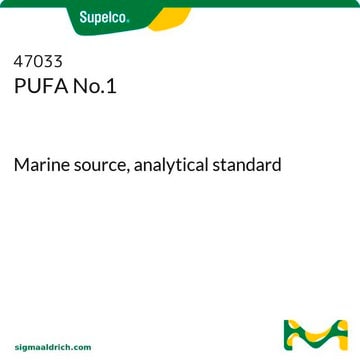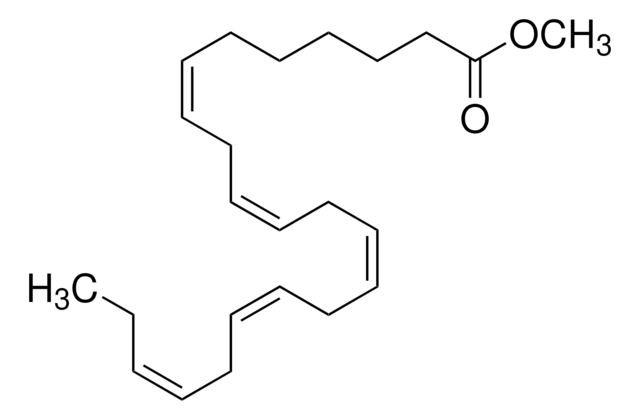47085-U
PUFA No.3
From Menhaden Oil, analytical standard
Synonym(s):
Polyunsaturated Fatty Acid Mix No. 3
Sign Into View Organizational & Contract Pricing
All Photos(1)
About This Item
UNSPSC Code:
85151701
NACRES:
NA.24
Recommended Products
biological source
fish oil (menhaden)
grade
analytical standard
CofA
current certificate can be downloaded
packaging
pkg of 100 mg
concentration
(var. concentration)
technique(s)
HPLC: suitable
gas chromatography (GC): suitable
application(s)
food and beverages
format
neat
storage temp.
-10 to -25°C
General description
PUFA No.3 is a complex qualitative standard mixture. Because it is extracted from natural materials, relative peak size and composition may vary from lot to lot.
Application
Refer to the product′s Certificate of Analysis for more information on a suitable instrument technique. Contact Technical Service for further support.
Other Notes
For qualitative identification only.
Product is extracted from natural sources. The fatty acid composition varies from lot to lot. The fatty acids listed below may or may not be present in the current lot. A representative chromatogram is supplied with the product.
Certificate of Composition is not available on-line. Please contact your local Sigma-Aldrich/Supelco office for documentation.
Product is extracted from natural sources. The fatty acid composition varies from lot to lot. The fatty acids listed below may or may not be present in the current lot. A representative chromatogram is supplied with the product.
Certificate of Composition is not available on-line. Please contact your local Sigma-Aldrich/Supelco office for documentation.
Analyte
Description
cis-4,7,10,13,16,19-Docosahexaenoic acid methyl ester
cis-11,14,17-Eicosatrienoic acid methyl ester
Methyl arachidonate
Methyl all-cis-7,10,13,16,19-docosapentaenoate
Methyl all-cis-5,8,11,14,17-eicosapentaenoate
Methyl cis-11-eicosenoate
Methyl linoleate
Methyl linolenate
Methyl myristate
Methyl oleate
Methyl palmitate
Methyl palmitoleate
Methyl stearate
Methyl stearidonate
11,14-Octadecadienoic acid methyl ester
9,11,14-Octadecatrienoic acid methyl ester
cis-11-Octadecenoic methyl ester
See All (17)
Signal Word
Warning
Hazard Statements
Precautionary Statements
Hazard Classifications
Eye Irrit. 2 - Skin Irrit. 2
Storage Class Code
10 - Combustible liquids
WGK
WGK 3
Flash Point(F)
Not applicable
Flash Point(C)
Not applicable
Personal Protective Equipment
dust mask type N95 (US), Eyeshields, Gloves
Choose from one of the most recent versions:
Already Own This Product?
Find documentation for the products that you have recently purchased in the Document Library.
Customers Also Viewed
Meriam Tir et al.
Lipids, 54(2-3), 163-176 (2019-03-21)
The aim of the present work was to study the effect of season on phospholipids and triacylglycerols (TAG) of mantle and tentacles of female and male wild Sepia officinalis. The identified phospholipids were phosphatidylethanolamine (PtdEtn), phosphatidylcholine (PtdCho), phosphatidylserine (PtdSer), and
Khaoula Telahigue et al.
Chemosphere, 269, 129376-129376 (2021-01-02)
In this study, the potential hazardous impacts of the technical grade glyphosate acid (GLY) and its commercial formulation roundup (RD®) were evaluated for the first time on holothurians. To do this, redox status, fatty acid (FA) profile, and histopathology aspects
Diana B Reis et al.
Comparative biochemistry and physiology. Part B, Biochemistry & molecular biology, 204, 53-60 (2016-11-15)
The present study compared the lipid composition and in vivo capability of Artemia sp. metanauplii (the main live prey used in aquaculture) and Grapsus adscensionis zoeae (as a wild zooplankton model) to metabolise unsaturated fatty acids. The two species were
Mohamed Emam et al.
Philosophical transactions of the Royal Society of London. Series B, Biological sciences, 375(1804), 20190648-20190648 (2020-06-17)
Atlantic salmon smolts (approx. 20-months old) were fed experimental diets with different combinations of omega-6:omega-3 fatty acids (FAs) (high-ω6, high-ω3, or balanced) and eicosapentaenoic acid plus docosahexaenoic acid (EPA + DHA) levels (0.3, 1.0 or 1.4%) for 12 weeks. Muscle
Giseli S Rocha et al.
Ecotoxicology (London, England), 25(8), 1468-1477 (2016-10-23)
Copper is an essential metal for several physiological and metabolic processes, but a narrow range regulate its effect in phytoplankton cells. It can affect the production of biomolecules and be toxic at concentrations slightly above those required, e.g. decreasing photosynthesis
Our team of scientists has experience in all areas of research including Life Science, Material Science, Chemical Synthesis, Chromatography, Analytical and many others.
Contact Technical Service










